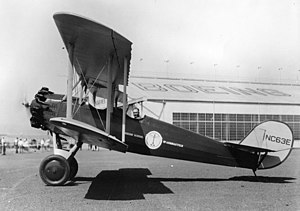Boeing Model 81
| Model 81 / XN2B | |
|---|---|

| |
| Role | trainer |
| National origin | United States |
| Manufacturer | Boeing |
| Introduction | 1928 |
| Primary user | Boeing School |
| Number built | 2 |
| Developed from | Boeing Model 64 |

The Boeing Model 81 was an American training aircraft built by Boeing in 1928. The Model 81 was a development of the Model 64. It was powered by a newly developed engine, the 125 hp 4-cylinder radial engine.[1] Operating at a much lower rpm than most engines (1000 rpm) it required the use of a large high-pitch propeller.[2]
After initial flight tests with the Fairchild-Caminez, the prototype was refitted with a 145 hp Axelson engine, redesignated Model 81A and delivered to the Boeing School of Aeronautics. There, it was re-engined a number of times, first with a 115 hp Axelson engine, redesignated Model 81B. It then received a 165 hp Wright J-6-5, then a 100 hp Kinner K-5 and a redesigned vertical tail. Redesignated Model 81C, it would later be removed from training service, re-engined with an Axelson engine, and used as a classroom trainer.[3]
On 21 June 1928, the second Model 81 built was delivered to the US Navy at Anacostia, Maryland for $8,300, and redesignated Boeing XN2B. Its trial with the Fairchild engine was unsatisfactory, and on 10 January 1929 it was refitted by Wright Aeronautical with a 160 hp Wright J-6-5 engine. Despite increased performance, it was not ordered into production.[4]
Variants[]
- 81
- Original Caminez-engined aircraft
- 81A
- 145 hp Axelson engine
- 81B
- 115 hp Axelson engine
- 81C
- 100 hp Kinner K-5, redesigned tail.
- XN2B
- US Navy designation.
Operators[]
- Boeing School of Aeronautics
Specifications (XN2B)[]
Data from Bowers, 1989. p. 144
General characteristics
- Crew: 2
- Length: 25 ft 8 in (7.82 m)
- Wingspan: 35 ft 0 in (10.67 m)
- Height: 11 ft 2 in (3.40 m)
- Wing area: 259 sq ft (24.06 m2)
- Empty weight: 1,652 lb (750 kg)
- Gross weight: 2,178 lb (988 kg)
- Powerplant: 1 × Fairchild-Caminez , 125 hp (93 kW)
Performance
- Maximum speed: 103.9 mph (167 km/h, 90.3 kn)
- Cruise speed: 86 mph (138 km/h, 75 kn)
- Range: 335 mi (539 km, 291 nmi)
- Service ceiling: 12,000 ft (3,660 m)
- Rate of climb: 515 ft/min (2.62 m/s)
References[]
| Wikimedia Commons has media related to Boeing Model 81. |
- ^ "A diagram of the 4-cylinder Fairchild-Caminez cam engine". Archived from the original on 2017-10-05. Retrieved 2011-11-12.
- ^ Bowers, 1989, p. 142
- ^ Bowers, 1989, pp. 144-145
- ^ Bowers, 1989, pp. 142-144
- Bowers, Peter M. Boeing aircraft since 1916. London: Putnam Aeronautical Books, 1989. ISBN 0-85177-804-6
- 1920s United States military trainer aircraft
- Boeing aircraft
- Single-engined tractor aircraft
- Biplanes
- Aircraft first flown in 1928